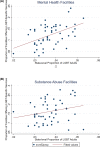The availability of LGBT-specific mental health and substance abuse treatment in the United States
- PMID: 32970327
- PMCID: PMC7704474
- DOI: 10.1111/1475-6773.13559
The availability of LGBT-specific mental health and substance abuse treatment in the United States
Abstract
Objective: To examine the availability and facility-level predictors of LGBT-specific mental health and substance abuse treatment in the United States.
Data sources/study setting: 2016 National Survey of Substance Abuse Treatment Services, 2016 National Mental Health Service Survey, and 2015-2016 Gallup Daily tracking survey.
Study design: Logistic regression models and average marginal effects were used to identify characteristics of facilities that offer LGBT-specific programs. Linear regression models were used to estimate the association between the state-level proportion of LGBT people and the proportion of facilities that offer LGBT-specific programs.
Data collection/extraction methods: Secondary data analysis. Cases with missing values for any predictor were excluded.
Principle findings: 12.6 percent of mental health and 17.6 percent of substance abuse facilities reported LGBT-specific programs. Several facility characteristics were statistically associated with the likelihood of mental health and substance abuse facilities providing LGBT-specific programs, including offering outpatient or residential treatment, private ownership, religious affiliation, and payment type. The proportion of LGBT adults living within each state was statistically associated with state-level density of LGBT-specific mental health programs, but not substance abuse programs.
Conclusions: Findings suggest limited availability of culturally competent mental health and substance abuse treatment, despite well-documented need.
Keywords: mental health; sexual and gender minorities; substance abuse; treatment.
© Health Research and Educational Trust.
Figures
Similar articles
-
Characteristics of Outpatient and Residential Substance Use Disorder Treatment Facilities with a Tailored LGBT Program.Subst Abuse. 2023 Jun 16;17:11782218231181274. doi: 10.1177/11782218231181274. eCollection 2023. Subst Abuse. 2023. PMID: 37342586 Free PMC article.
-
The Relationship Between Residential Mobility and Behavioral Health Service Use in a National Sample of Adults With Mental Health and/or Substance Abuse Problems.J Dual Diagn. 2018 Oct-Dec;14(4):201-210. doi: 10.1080/15504263.2018.1493557. Epub 2018 Oct 10. J Dual Diagn. 2018. PMID: 30303466
-
Do specialized services exist for LGBT individuals seeking treatment for substance misuse? A study of available treatment programs.Subst Use Misuse. 2007;42(1):161-76. doi: 10.1080/10826080601094207. Subst Use Misuse. 2007. PMID: 17366131
-
Substance Abuse Prevention, Assessment, and Treatment for Lesbian, Gay, Bisexual, and Transgender Youth.Pediatr Clin North Am. 2016 Dec;63(6):1057-1077. doi: 10.1016/j.pcl.2016.07.007. Epub 2016 Oct 12. Pediatr Clin North Am. 2016. PMID: 27865333 Review.
-
Current State of Knowledge About Cancer in Lesbians, Gay, Bisexual, and Transgender (LGBT) People.Semin Oncol Nurs. 2018 Feb;34(1):3-11. doi: 10.1016/j.soncn.2017.11.003. Epub 2017 Dec 25. Semin Oncol Nurs. 2018. PMID: 29284587 Review.
Cited by
-
Depression, Anxiety, and Alcohol Use Among LGBTQ+ People During the COVID-19 Pandemic.Am J Public Health. 2021 Sep;111(9):1610-1619. doi: 10.2105/AJPH.2021.306394. Epub 2021 Aug 19. Am J Public Health. 2021. PMID: 34410817 Free PMC article.
-
The Patient Population of a No-Cost, Student-Run LGBTQ+ Mental Health Clinic: A Case for Equitable and Trauma-Informed Care.J Gay Lesbian Ment Health. 2024;28(3):388-401. doi: 10.1080/19359705.2023.2183536. Epub 2023 Mar 13. J Gay Lesbian Ment Health. 2024. PMID: 39246532 Free PMC article.
-
Smoking Intervention Practices in Texas Healthcare Centers with Sexual and Gender Minority Patients.Health Behav Policy Rev. 2022 Nov;9(6):1074-1088. doi: 10.14485/hbpr.9.6.1. Epub 2022 Nov 1. Health Behav Policy Rev. 2022. PMID: 36778530 Free PMC article.
-
Understanding why racial/ethnic inequities along the HIV care continuum persist in the United States: a qualitative exploration of systemic barriers from the perspectives of African American/Black and Latino persons living with HIV.Int J Equity Health. 2023 Aug 30;22(1):168. doi: 10.1186/s12939-023-01992-6. Int J Equity Health. 2023. PMID: 37649049 Free PMC article.
-
Organizational Change Strategies to Support High-Quality Behavioral Health Care for LGBTQ Individuals.Community Ment Health J. 2023 Oct;59(7):1243-1250. doi: 10.1007/s10597-023-01135-9. Epub 2023 May 11. Community Ment Health J. 2023. PMID: 37166539 Free PMC article.
References
-
- Substance Abuse and Mental Health Services Administration . Key Substance Use and Mental Health Indicators in the United States: Results from the 2017 National Survey on Drug Use and Health; 2018:124.
-
- Cochran BN, Cauce AM. Characteristics of lesbian, gay, bisexual, and transgender individuals entering substance abuse treatment. J Subst Abuse Treat. 2006;30(2):135‐146. - PubMed
-
- Herbst JH, Jacobs ED, Finlayson TJ, et al. Estimating HIV prevalence and risk behaviors of transgender persons in the United States: A systematic review. AIDS Behav. 2008;12(1):1‐17. - PubMed
-
- Hughes TL, Eliason M. Substance use and abuse in Lesbian, Gay, bisexual and transgender populations. J Prim Prev. 2002;22(3):263‐298.


